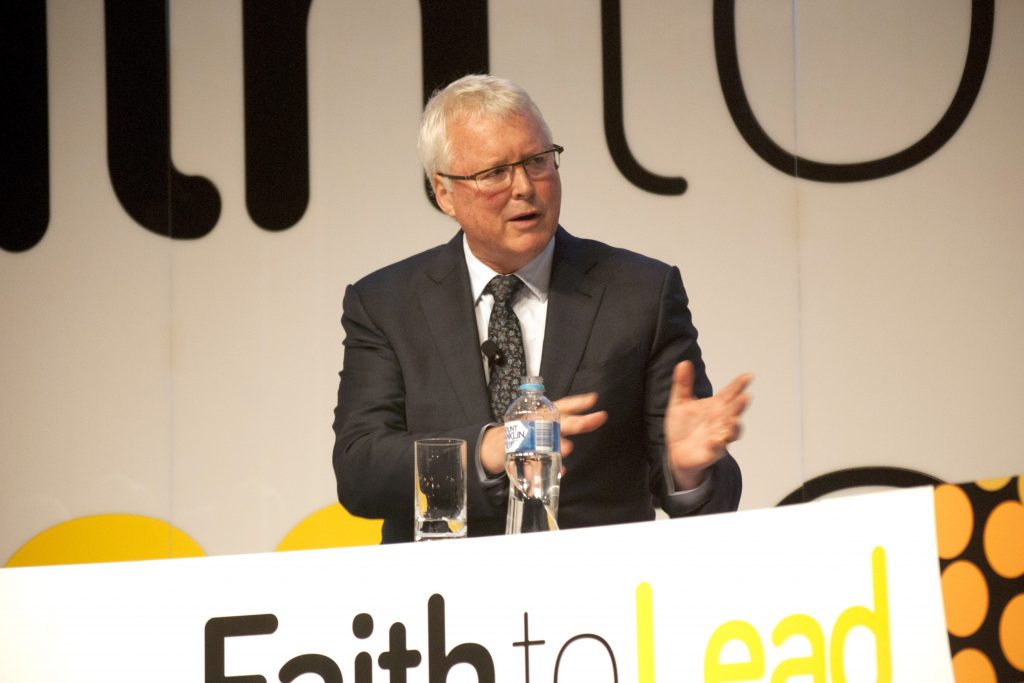
By Rachel Curry
No topic was off limits for Catholic education stakeholders as they discussed the secularisation of schools, same-sex marriage and the impact of the Royal Commission at a special Q&A panel discussion in Perth last week.
The event formed part of the 2016 National Catholic Education Commission Conference and was chaired by ABC journalist Tony Jones, who led six panellists through a robust discussion on ‘The Place and Role of Catholic Education’.
The panel agreed that the sector was in an extremely strong position in Australia and Port Pirie Bishop Greg O’Kelly SJ went so far as to say it would be one of the primary ways the Church would carry forward its mission in the future.
“It’s going to be a crucial question down the track. As our parishes decline, the presence of the Church, I think, will be in its ministries: of healing, teaching, welfare and so on,” he said.
“It’s the works of mercy through which the Church will be showing itself.”
Some audience members questioned whether Catholic schools were becoming too secularised, citing growing enrolments of non-Catholic students and an increasing focus on history at the expense of spirituality in the teaching of Religion Education classes.
However, Australian Catholic University Vice-Chancellor, Greg Craven, vehemently rejected that notion.
“I often think the doomsay in the Church about Catholic education is positively hilarious. We have one of the biggest, the most vital, the most well-funded, the most well-respected Catholic education systems in the world,” he said.
“When you see the self-evident goodness of our students and our teachers and our staff, where is that coming from, if it’s not coming from the heart of the Church and coming from the heart of Christ?”
The 1,400-person strong audience also interjected on the topic, after Mr Jones asked the panel who was passing on the Church’s message if only 19 per cent of teachers in Catholic schools were practising Catholics.
A chorus of “We are” from the gallery gave him his answer.
On the topic of same-sex marriage, the majority of the panel were opposed to a plebiscite, which they speculated would be grounds for spreading hate.
Bishop O’Kelly said if the plebiscite went ahead, he hoped the Church would simply state its position without campaigning on the issue.
He repeated his opposition to same-sex marriage, which he suggested would create another “stolen generation” of children who were denied their right to a mother and a father.
”A child is a gift from God. It’s not something that I have a right to,” Bishop O’Kelly said.
“I do believe the rights of a child have been submerged by the rights of those claiming to be able to have that child.”
Catholic School Parents Australia Deputy Chair, Carmel Nash, said she felt her Catholic faith called on her to respect the rights of every person, including those in same-sex relationships.
“The Church doctrine has to be respected but I think that many parents and families have probably, rightly or wrongly, moved on from that view,” she said.
The panel were also asked about what impact the findings of the Royal Commission into Institutional Responses into Child Sexual Abuse would have on Catholic schools.
Mr Craven predicted there would be a raft of implications, adding that the Church was hoping for progress on the establishment of a national compensation scheme for victims.
“I don’t think there’s any doubt that the position of the Catholic Church is that it attends to account and to atone,” he said.
“That is our position and the sooner we get on with it – the sooner we’re allowed to get on with it – the better.”
Mrs Nash said while she had expected the Royal Commission to prompt backlash within Catholic schools, most parents believed the issue of child sexual abuse was one of the past.
“I think parents have seen the work that’s gone on and really have felt safe, even though there are some recent cases,” she said.
In an interview with The eRecord before the event, Mr Jones said Catholic schools were unique because they catered to a broad range of students, from the very wealthy to the underprivileged.
While Mr Jones was raised as an Anglican, one of his sons attended a Catholic school – Marcellin College in Sydney.
“I think parents tend to send their kids to Catholic schools because they want discipline, a good formative education and they trust their kids to be in that environment,” he said.
Mr Jones said if the plebiscite same-sex marriage went ahead, he would be curious to see how the Church – and, by extension, Catholic schools – responded to the situation.
“Only 19 per cent of teachers in Catholic schools are practising Catholics so it’s going to be very interesting for them. If the Church has a very strong position, how will that be reflected in schools?” he asked.